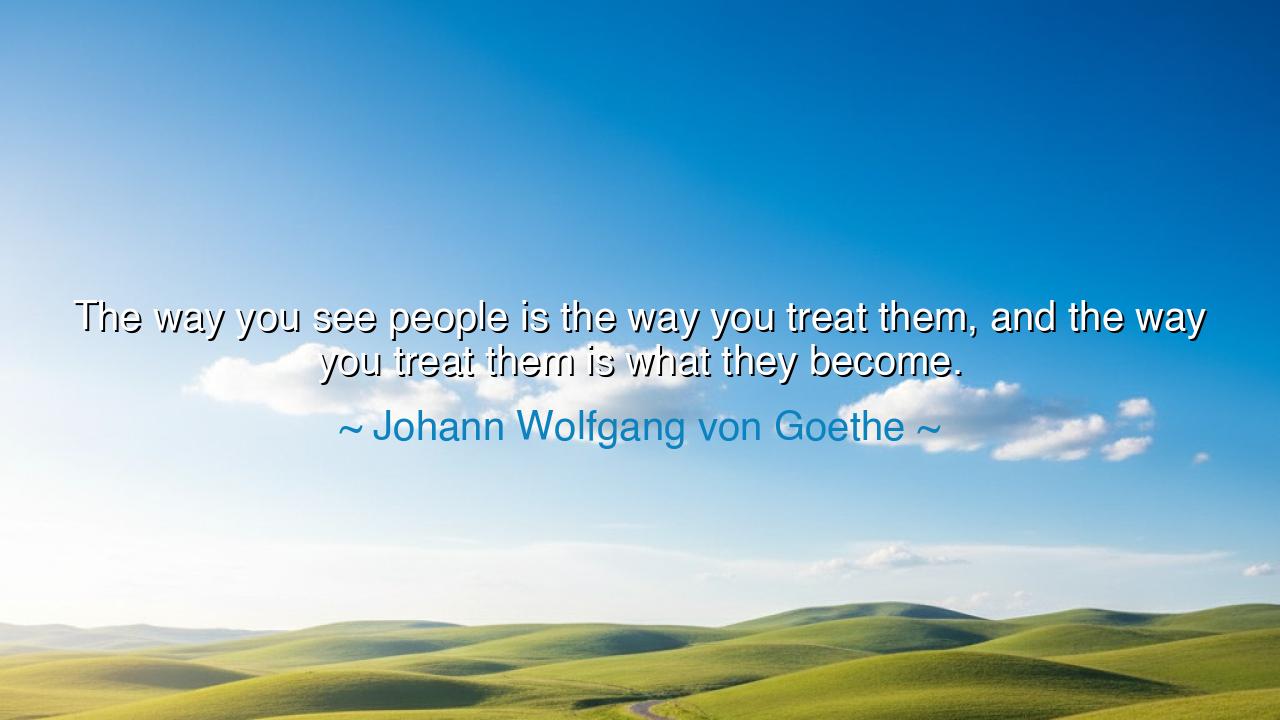
The way you see people is the way you treat them, and the way
The way you see people is the way you treat them, and the way you treat them is what they become.






"The way you see people is the way you treat them, and the way you treat them is what they become." Thus spoke Johann Wolfgang von Goethe, sage of Germany, whose words pierce into the very mystery of human nature. He unveils the sacred chain between vision, action, and destiny: how a man perceives another shapes his behavior, and how he behaves in turn shapes the soul before him. To see with contempt breeds contempt; to see with honor calls forth greatness.
The ancients knew this truth. The teacher who saw his pupil as ignorant treated him with scorn, and the child remained small. But the master who saw a spark of potential treated the same child with patience and dignity, and soon the child rose into wisdom. In this way, men and women are like seeds—what they become depends on the gaze and the care bestowed upon them. The gardener who looks upon a seed as useless leaves it in the dark; the one who sees life waters it until it blossoms.
History reveals this law in the life of George Washington Carver. Born into slavery, many saw him as nothing, and treated him as such. Yet a few looked upon him with hope, granting him education and respect. Through this treatment, he became one of the greatest scientists and educators of his age. Had he been forever seen as worthless, the world would have been robbed of his genius. His life proves Goethe’s wisdom: perception and treatment shape destiny.
So too in the realm of leadership. Abraham Lincoln saw not merely enemies in the South, but human beings capable of reconciliation. Because he treated them with mercy, speaking of "malice toward none, charity for all," he planted seeds of healing rather than endless hatred. His vision of others shaped his treatment, and his treatment shaped what the nation slowly became.
Therefore, let this wisdom endure: guard your eyes, for how you see others will govern your deeds, and your deeds will shape their souls. If you look upon men as beasts, they may descend to beasts; if you look upon them as bearers of divine fire, they may rise to it. To see, to treat, to shape what they become—this is the holy chain of influence. Walk it wisely, and you will lift others toward greatness.






HHhai hau
Zooming out, the idea has heavy implications for systems shaped by stereotypes: policing, healthcare, classrooms, hiring. Expectations are unevenly distributed, and some groups are consistently seen through a narrower lens. What evidence-based practices reduce the impact of biased expectations without resorting to performative niceness? I'm thinking structured interviews, anonymized evaluations, blind auditions, and transparent criteria. Could you rank interventions by effect size and feasibility, and note any unintended consequences? How do we keep empathy from becoming unequal indulgence while still widening the circle of possibility?
TPTham Pham
I'm trying to apply this at work with a teammate who keeps missing deadlines. If I define them as a liability, I'll tighten control and probably breed disengagement. If I define them as a learner, I'll invest time, which might be wasted. Could you suggest a quick experiment: a two-week plan of check-ins, feedback style, and metrics to test whether a growth-oriented approach actually improves reliability? Also, a fallback path if results don't change, so I'm not trapped by optimism?
UNngoc tieu uyen nguyen
This makes me think about boundaries and moral responsibility. If my stance influences who someone becomes, am I ethically obliged to adopt the most charitable stance possible? Or does that slip into manipulation, shaping people to fit my ideals? In restorative justice, parties are invited to see the person beyond the harm; in safety-critical contexts, we prioritize risk mitigation over optimistic framing. How do we decide which lens is appropriate? Please compare contexts where cautious realism is wiser than aspirational belief, and vice versa.
TNTham Nguyen
As a parent, this lands close to home. I notice how tiny signals add up: eye contact at pickup, patience during homework, celebrating effort over outcome. Yet I'm scared of creating a pressure bubble by constantly seeing my child as exceptional. How do I hold a hopeful picture without turning it into a standard they must perform to? What daily rituals keep my own projections in check? Any prompts for journaling or conversations that help kids tell their own story rather than absorbing mine?
BABao an
Part of me bristles at the implication that my perception might sculpt another person. People aren't clay; they push back, surprise us, resist projections. How do we balance the power of expectation with the need for accountability and honest feedback? If I treat a harmful behavior gently because I'm trying to see potential, do I enable it? Conversely, if I confront it bluntly, am I casting someone into a fixed identity? Where is the line between compassionate framing and denial? I'm looking for a framework that preserves agency while encouraging growth.